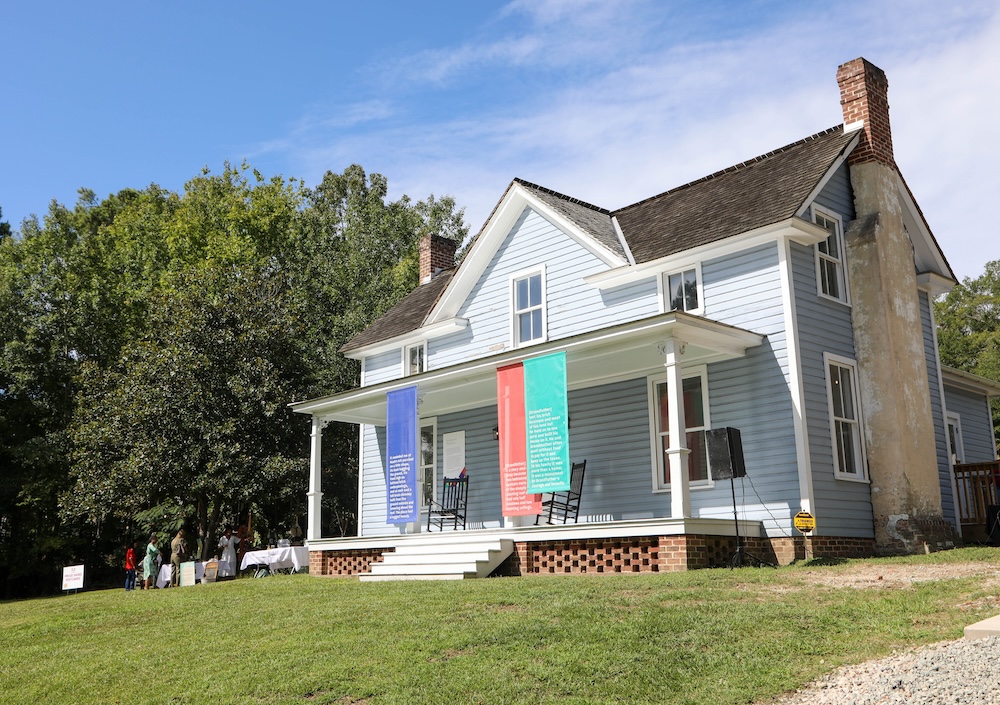The biography of a renowned national civil rights activist with deep Durham roots has been scrubbed from the National Park Service (NPS) website.
Pauli Murray was a trailblazer in the world of civil rights, LGBTQ rights, women’s rights, and the Episcopal church. Until recently, the NPS site featured an in-depth account of Murray’s life and legal contributions. That page has now vanished, and visitors are met with a “Page not Found” message.
Durham is home to the Pauli Murray Center for History and Social Justice, located in Murray’s former childhood home. Employees at the center sharply criticized the removal of the webpage, which was first reported by National Public Radio.
“In a time where violence of many kinds persists, it feels so important to know our history, to keep the memories and the examples of people who lived before us and encountered systemic challenges,” said Jesse Huddleston, board chair for the Pauli Murray Center. “I think it’s a little easier to find the courage to speak up, to speak out, when we know there are people who lived before us who did the same thing.”
“This is a decision to deny that truth, to erase that history, to remove the opportunities for more people to be inspired to do their part to make the world a better place,” Huddleston continued. “No one wins when we invisibilize and deny actual real people contributing to our community.”

The National Park Service could not be immediately reached for comment.
Murray (1910-1985) was the first Black person to earn a Doctor of the Science of Law (JSD) degree from Yale Law School, a co-founder of the National Organization for Women, and the first Black woman to be ordained as an Episcopal priest.
The activist’s influence extended across major civil rights causes. Thurgood Marshall once called Murray’s 1950s book, “States’ Laws on Race and Color,” the “Bible” for civil rights litigators. President John F. Kennedy appointed Murray to the Presidential Commission on the Status of Women. Supreme Court Justice Ruth Bader Ginsburg acknowledged Murray as a key inspiration for her landmark Reed v. Reed brief—the first time the nation’s highest court recognized women as victims of sex discrimination.

Murray, who was LGBTQ, also had a complex relationship with gender. Murray used she/her pronouns but changed her name from Anna Pauline to the more androgynous name “Pauli.” Historian Rosalind Rosenberg, author of “Jane Crow: The Life of Pauli Murray,” argues that Murray identified as a transgender man but lacked the language to articulate that identity at the time.
The Pauli Murray Center, which works to advance engagement across race, class, sexual orientation, and gender identity, was designated a National Historic Landmark in 2016. While a link describing the landmark remains active on the NPS website, the LGBTQ acronym in the description has been altered. The letters “T” and “Q”—standing for “transgender” and “queer”—have been removed, leaving only the letters “LGB.”
The removal and alteration of Murray’s NPS pages, are part of a broader federal effort to erase references to transgender history from public records. In recent weeks, National Park Service web pages dedicated to a Black LGBTQ bar in Washington D.C., Philadelphia’s gay history, and Marsha P. Johnson and Sylvia Rivera—key figures in the 1969 Stonewall Uprising—have also vanished.
An NPS page describing the Stonewall Uprising was similarly revised, replacing “LGBTQ+” with “LGB.” It now reads: “Before the 1960s, almost everything about living openly as a lesbian, gay, bisexual (LGB) person was illegal, but the events at the Stonewall Inn sparked fresh momentum for the LGB civil rights movement!”
The Trump administration has also issued executive orders aimed at eliminating the concept of “gender identity” and banning transgender athletes from competing in women’s sports.
In a press release, the Pauli Murray Center condemned the changes to Murray’s pages on the National Parks Service site.
“Members of the LGBTQIA+ community have always been a part of the rich fabric of our society,” the release states. “Rev. Dr. Murray exists in a lineage of LGBTQIA+ Southerners who have advanced social justice work on a national scale, and whose contributions have gone on to shape history. Erasing this truth at the federal level censures American history, and compromises the work of transgender and queer activists who stand in Murray’s wake today.”
Angela Thorpe Mason, executive director of the Pauli Murray Center, wrote in the release that she will continue to honor Murray’s full legacy.
“We will not be deterred from uplifting Rev. Dr. Pauli Murray’s identity, life, and legacy as we work towards addressing today’s inequities and injustices,” she said. “We equally condemn the federal government’s actions, and stand firm in ours. The Pauli Murray Center will be a space for us to continue to articulate what we know to be true.”
Above: The Pauli Murray Center, housed in Murray’s childhood home, opened in Durham in September. Photo by Abigail Bromberger — The 9th Street Journal






